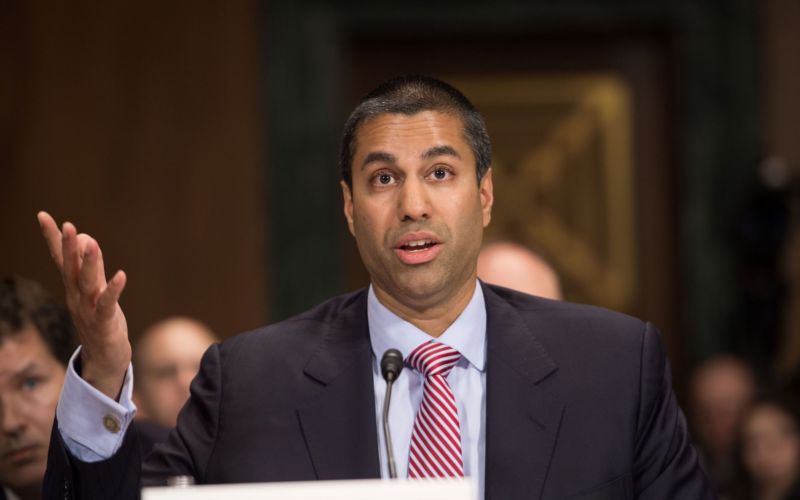
The Federal Communications Commission was sued today by a group that says the commission failed to comply with a public records request for communications about net neutrality between FCC officials and Internet service providers.
On April 26, a nonprofit called American Oversight filed a Freedom of Information Act (FoIA) request asking the FCC for all records related to communications on net neutrality between Internet service providers and Chairman Ajit Pai or Pai's staff. The group asked for "correspondence, e-mails, telephone call logs, calendar entries, meeting agendas," and any other records of such communications.
The group also asked for similar records related to FCC communications with members of Congress, congressional staff, and members of the media. But American Oversight's lawsuit against the FCC says the commission hasn't complied with the requests.
“The FCC has made it clear that they’re ignoring feedback from the general public, so we’re going to court to find out who they’re actually listening to about net neutrality," American Oversight Executive Director Austin Evers said in the group's announcement of its lawsuit. "If the Trump administration is going to let industry lobbyists rewrite the rules of the Internet for millions of Americans, we’re going to make them do it in full view of the public." (Evers was previously a US State Department lawyer.)
FCC repeatedly asked for delays, lawsuit says
American Oversight describes itself as an "organization committed to the promotion of transparency in government" that files public records requests to educate the public about federal government operations. The group's complaint against the FCC in US District Court for the District of Columbia was detailed in a Gizmodo story and is available here.
"After initially agreeing to process American Oversight’s requests quickly, the FCC repeatedly delayed releasing the records even as the Trump administration continued its work to roll back the open Internet rules," American Oversight said.
The FoIA law requires an agency to inform a records requester of the agency's decision to grant or deny access to requested records within 20 business days and to release the records shortly after that.
The FCC repeatedly requested extensions after getting the FoIA request from American Oversight, the group's complaint says. The nonprofit agreed to the first two extension requests, giving the FCC until July 24 to respond. The FCC asked for another one-month extension on July 21, but American Oversight refused to agree to a third extension.
Since the July 24 deadline passed, "American Oversight has received no further communication from FCC regarding the processing of its FOIA requests," the complaint said.
American Oversight asked for a court order requiring the FCC to produce the required records within 20 days and to pay damages and court costs.
We asked Pai's office for a response to the lawsuit today and will update this story if we hear back.
American Oversight's FoIA request on April 26 was filed just after Pai announced his plan to roll back net neutrality rules. The public records request said:
Earlier today, Mr. Pai gave a speech outlining his plans to further alter the net neutrality rules established by the FCC during the prior administration. These remarks followed reports that Mr. Pai has been meeting with telecom trade associations and large internet companies to discuss the Commission’s plans for the future of net neutrality. Given that Mr. Pai has declined to publicly discuss the details of those meetings, American Oversight is seeking to gain insight into those meetings via the Freedom of Information Act. The public should have access to communications related to the shaping of such influential regulations; significant regulatory changes should not be shaped by secret influences.
Pattern of denial
The FCC has also been secretive in response to FoIA requests regarding its analysis of DDoS attacks that hit the commission's net neutrality comment system in May. In response to a FoIA request from Gizmodo, the FCC said its analysis of DDoS attacks "stemmed from real time observation and feedback by Commission IT staff and did not result in written documentation."
After various media outlets wrote about this refusal to provide records, the FCC claimed that Gizmodo only asked for analysis produced on May 8, the day of the attack, and that the FCC thus doesn't have to provide any written analysis produced after that date.
US Senator Ron Wyden (D-Ore.) criticized the FCC for apparently "playing word games to avoid responding to FoIA requests" and "violat[ing] Chairman Ajit Pai’s pledge to increase transparency at the FCC.”
Gizmodo pointed out that it asked for any records related to the DDoS analysis, such as e-mails, and not just for the analysis itself. The FCC's statement that there is no documentation from May 8 would mean "that for a period of about 15 hours, no one in the agency’s IT department wrote a single e-mail or memo, nor did they take down any notes of any kind about the cyberattack that, according to Chairman Pai, caused a malicious 3,000-percent increase in network traffic," Gizmodo wrote.
The FCC also denied a FoIA request filed by Ars for e-mails and other communications and records related to the attack on the net neutrality comment system and related downtime. The FCC told us that it won't release the records because of an ongoing "internal investigation."
Freelance journalist Kevin Collier also filed a lawsuit against the FCC today, alleging that the commission failed to comply with FoIA requests about the alleged DDoS attack and the agency's analysis of of anti-net neutrality comments generated by astroturfers.
reader comments
84